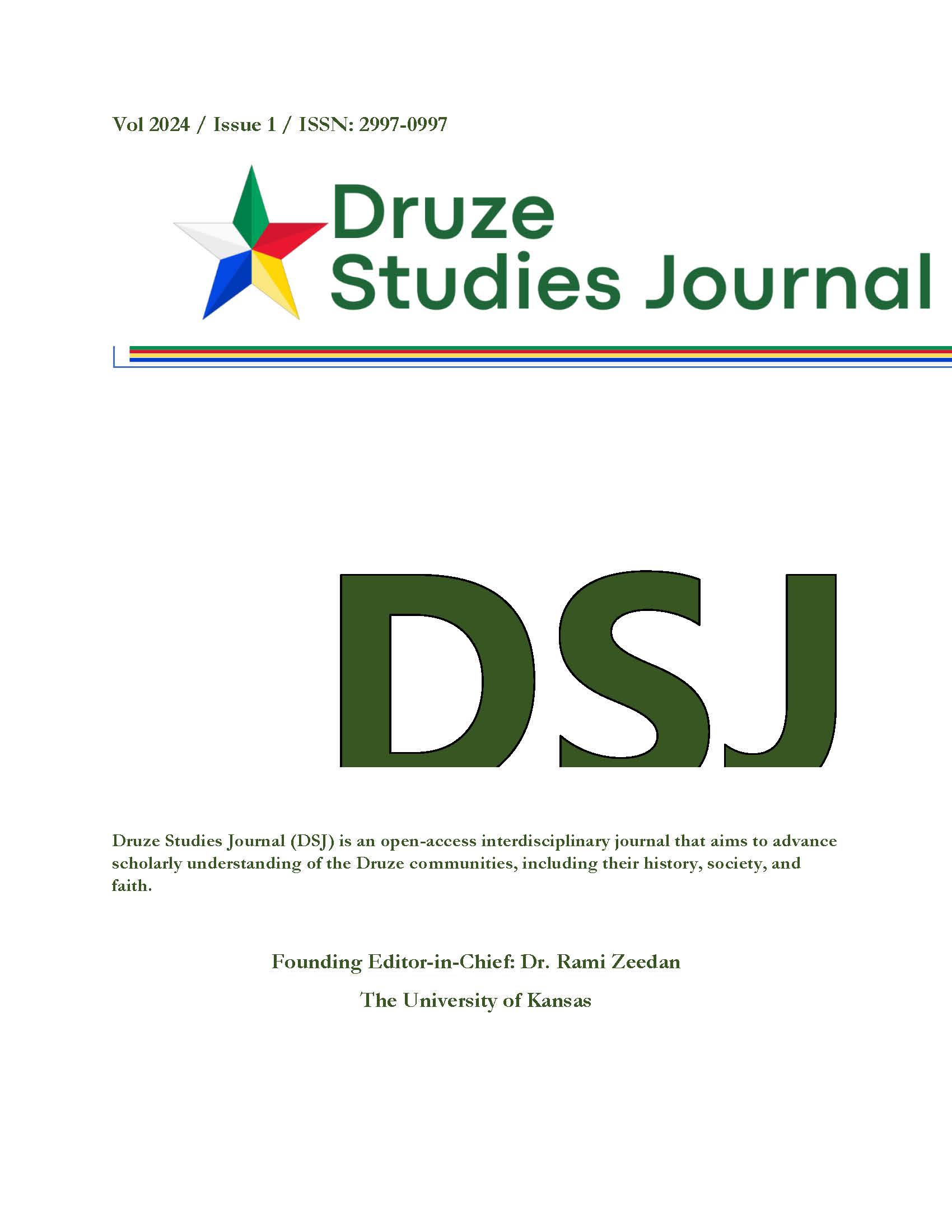The Office of Shaykh al-‘Aql of the Druze in Lebanon
Book forum: Abou Zaki, Said. 2021. Mashyakhat ‘Aql al-Duruz fi Lubnan: Bahthun fi Usuliha wa-Ma‘naha wa-Tatawwuriha [The Office of Shaykh al-‘Aql of the Druze in Lebanon: An Investigation into Its Origins, Meaning and Development]. Beirut: Dar el-Machreq.
DOI:
https://doi.org/10.17161/druze.1.22847Keywords:
Druze, Religious leadership, Shaykh al-‘Aql, Ottoman Empire, History of Lebanon, Oral Tradition, Oral HistoryAbstract
This book forum centers on Said Abou Zaki's Arabic book, “The Office of Shaykh al-‘Aql of the Druze in Lebanon.” It includes contributions from various scholars, each offering a unique perspective on the historical and institutional analysis of Druze religious leadership in Lebanon: Tuba Yildiz, Yusri Hazran, Akram Khater, and Abdul Rahman M. Chamseddine. Yildiz acknowledges the lack of historical readings and erroneous information in early 20th-century works on the Druze. She appreciates Abou Zaki's comprehensive study of Lebanese and Ottoman perspectives, offering a broader understanding of the Druze religious institution's development and its connection with the Ottoman Empire's socio-religious policies. Hazran commends the book for providing a comprehensive historical study of the Druze community's religious and spiritual leadership, shedding light on its evolution from the 11th century through to the Ottoman Empire's fall. Although the book excels in its research methods and historical insights, Hazran suggests strengthening it by addressing specific methodological and historical issues, such as placing the discussion on existing narratives and substantiating Emir Bashir Shihab II's role in the schism. Khater highlights the internal tensions in Abou Zaki's book arising from its threefold goals: serving as a historiographical essay, an origins story, and a history of Mashyakhat al-‘Aql. Khater commends the work's critical review of existing literature and acknowledges the book's significant contribution to understanding the position of Shaykh al-‘Aql amidst political crises. Chamseddine praised Abou Zaki's critical historiographical approach and genealogical method. Chamseddine highlights the importance of integrating oral histories and local traditions into academic research. He notes that Abou Zaki's work sheds light on the Druze community's religious evolution, although he critiques the book's occasional lack of coherence due to abrupt transitions and unexplained terminology. The reviewers concluded that the book constitutes a significant contribution to Druze Studies.
Downloads
References
Abou Zaki, Said. 2021. Mashyakhat ‘Aql al-Duruz fi Lubnan: Bahthun fi Usuliha wa-Ma‘naha wa-Tatawwuriha [The Office of Shaykh al-‘Aql of the Druze in Lebanon: An Investigation into Its Origins, Meaning and Development]. Beirut: Dar el-Machreq.
Abou Zaki, Said. 2023. "Al-Raʾis al-Ruhi li-al-Muwahhidin al-Duruz al-Shaykh Amin al-Sayigh Yakshif al-Haqaʾiq al-Murra." [The Spiritual Leader of the Druze, Shaykh Amin Al-Sayegh, Reveals the Bitter Truths] Nidaa al-Watan, January 14, 2023.
Abu-Shaqra, ‘Arif. 1952. Al-Harakat fi Lubnan ila ‘Ahd al-Mutasarrifiyyat [Insurgencies in Lebanon to the Era of the Mutasarrifiyyat]. Beirut.
Al-ʿAridi, Shaykh Abu Salih Farhan. Interview by Said Abou Zaki. Baysur, November 24, 2004.
Doha Magazine. 1992. “Sirat al-Rahil al-Jalil Qabl Tawallihi Maqam Mashyakhat ‘Aql al-Taʾifa al-Durziyya.” Doha Magazine, Special Issue: Shaykh al-‘Asr 1910–1991, January 1992, 39–40.
Ghannam, Shaykh Abu Muhammad Najib. Interview by Said Abou Zaki. Kafrhim, November 17, 2004.
Salman, Tawfiq. 1963. Adwa’ ‘ala Tarikh Madhhab al-Duruz [Spotlight on the History of the Druze Sect]. Beirut: Dar Alf Layla Wa Layla.
Talih, Amin. 1971. Mashyakhat al-‘Aql wal Qada’ al-Madhhabi al-Durzi ‘Ibra al-Tarikh [Office of Shaykh al-‘Aql and the Druze Judiciary Throughout History]. Beirut.
Downloads
Published
Issue
Section
License
Copyright (c) 2024 Abdul Rahman M. Chamseddine, Yusri Hazran, Akram Khater, Tuba Yildiz, Said Abou Zaki

This work is licensed under a Creative Commons Attribution-NonCommercial 4.0 International License.
Copyright is held by the author(s). This work is licensed under a Creative Commons Attribution-NonCommercial 4.0 International License.




